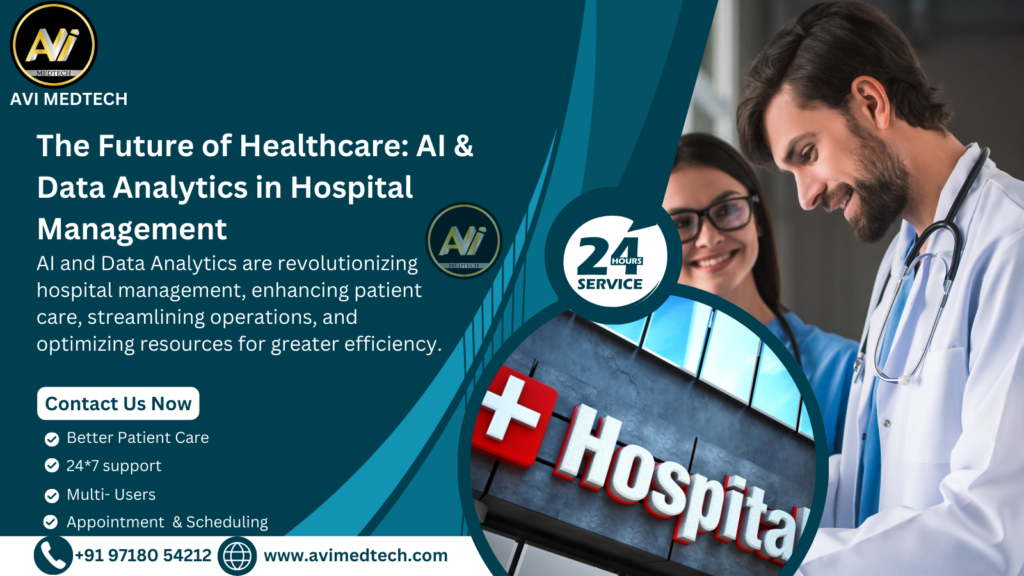Revolutionizing Healthcare: AI & Data in Hospital Management
Healthcare has evolved through technology for better care and also efficiency. Examples are data analytics and artificial intelligence as these stand powerful instruments within then changing faces of management of hospitals. This paper explores how AI and data analytics will shape the future of healthcare.
Role of AI in Healthcare
AI is rapidly transforming hospital management by enhancing decision-making ,furthermore operational efficiency, and patient care.
1. AI-Driven Predictive Analytics
Hospitals can predict then needs of the patients and demands also on operations using AI-driven predictive analytics.
AI uses historical data to predict patient readmissions, assess risks, and optimize resources for better care.
2. Clinical Decision Support Systems (CDSS)
AI-based clinical decision support systems enable physicians to take better, on-time, and accurate clinical decisions. AI analyzes millions of patient records to provide doctors with evidence-based also recommendations. Real-time alerts help doctors reduce in other words errors and ensure the right outcomes, delivering quality patient care.
3. Automatic administrative tasks
AI automates routine tasks likewise scheduling, billing, and claims processing, reducing administrative work in hospitals. An AI chatbot streamlines appointment scheduling by handling patient queries, freeing staff for complex tasks.
Data Analytics: The New Face of Hospital Management
Hospital adoption boosts strategic decisions, enhancing patient satisfaction and efficiency.
1. Real-time data for more informed decision-making processes.
Real-time data availability aids in decision-making for patient care and hospital operations. Providers access complete patient details, from EHR to lab results, ensuring precise diagnosis and then efficient care.
Real-time data optimizes staffing, resources, and patient flow also in hospitals. Data analytics allows hospital administrators to proactively adjust care and performance for better patient outcomes.
2. Improvement of Patient Outcomes with Data-Driven Care
By analyzing data trends and patterns, AVI MedTech’s software identifies disease signs, risk factors, and enables personalized, accurate treatments to improve patient outcomes.
Predictive analytics helps identify at-risk patients early, similarly enabling then hospitals to take preventive measures and improve long-term health outcomes.
3. Optimize Resource Allocation
The management can track patient trends, treatment protocols accordingly , and outcomes for better decision-making. Optimizing staff and equipment deployment for maximum efficiency.
It optimizes health equipment and supplies, also ensuring essentials are available in emergencies.
End
AI and data analytics empower hospitals to make rapid, data-driven decisions, transforming management and driving innovation. The predictive analytics feature allows then prediction of trends, optimizes operations, and improves patient care outcomes.
The algorithm predicts seasonal factors, enabling hospitals to adjust then personnel and equipment for potential surges.
The Future: Innovation in Healthcare
Emerging technologies like AI and data analytics are transforming healthcare, creating smarter, more efficient systems. Hospitals employing such ideas shall do better in delivering proper quality through the optimization operation of work.
AI and data analytics help healthcare providers consequently streamline operations and deliver patient-centric care. With health care becoming increasingly complex and challenging, such technologies are going to emerge as important players in designing the future of hospital management.
AI and data analytics are essential for modern health facilities to enhance efficiency accordingly, reduce costs, and improve patient comfort. The scope for new inventions and innovation in AI and data analytics in health care is limitless, in my opinion, thrilling with the progression of time and improvement in technology.
This is a reflection on the power that AI and data moreover analytics might have in reshaping healthcare management for the future of hospital management systems.

